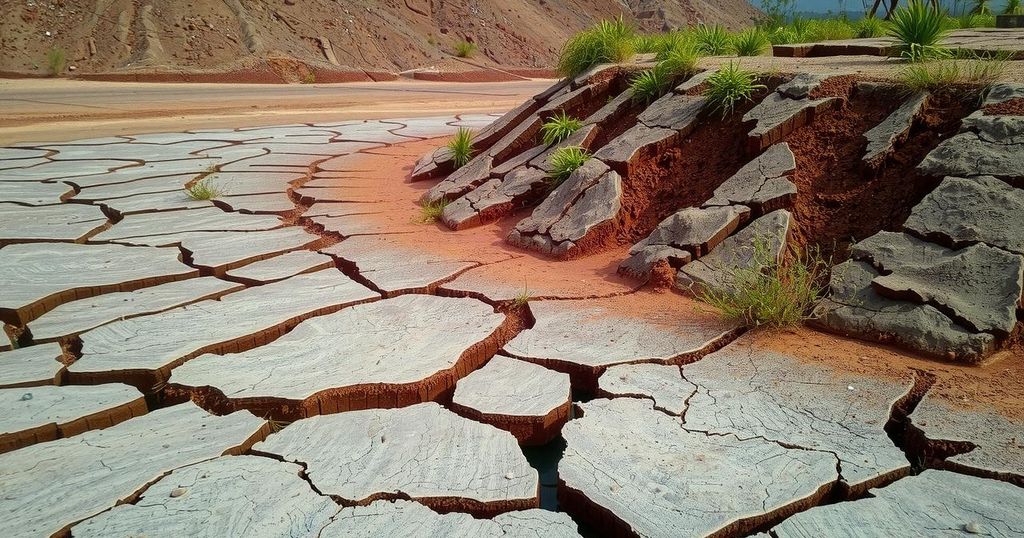Climate change
Companies
AFRICA, ASIA, BEIJING, BUSINESS & HUMAN RIGHTS RESOURCE CENTRE, CHINA, CLIMATE CHANGE, COPPERBELT, FLOODING, INDONESIA, INFRASTRUCTURE, KAFUE, KAFUE RIVER, KITWE, MEXICO, MINING, NORTH AMERICA, OBI ISLAND, POLLUTION, SEAN CORNELIUS, SINO - METALS, ZAMBIA, ZHANG PEIWEN
Fatima Khan
0 Comments
Environmental Destruction in Zambia: The Consequences of Mining Operations
The Kafue River in Zambia has become a toxic wasteland due to an acid leak from a Chinese-operated mine, highlighting a concerning trend of environmental destruction linked to Chinese mining practices across Africa. These operations not only threaten local ecosystems but also jeopardize communities dependent on natural resources. The situation calls for enhanced regulations and accountability to prevent further devastation.
In Zambia, the Kafue River has suffered devastating consequences due to an acid leak from the Chinese-operated Sino-Metals Leach Zambia mine on February 18. This incident transformed the once-thriving river into a toxic wasteland, resulting in the loss of aquatic life and bird populations. Sean Cornelius, a local resident, expressed the tragedy by stating, “Now everything is dead. Overnight, this river died.” This event highlights a disturbing trend of environmental destruction linked to Chinese mining activities throughout Africa.
The acid spill was so detrimental that it prompted the suspension of Kitwe’s water supply, impacting 700,000 residents. The Zambian government took emergency measures by deploying their air force to disperse lime into the river in an attempt to neutralize the acid. However, experts worry that the damage may last for years, as mining waste could contaminate groundwater. Despite a statement from Zhang Peiwen, chairman of Sino-Metals, expressing a desire to restore the environment, similar past pledges have often resulted in minimal action.
Soon after the Kafue incident, another acid leak was discovered at a second Chinese-owned mine in Zambia’s Copperbelt, which reportedly attempted to conceal the event. The severity of the situation was underscored by the death of a mine worker due to an acid fall, highlighting negligence as operations continued despite government shutdown orders.
Zambia’s plight is not unique, as a study conducted from 2021 to 2022 by the Business & Human Rights Resource Centre identified 102 instances of environmental and human rights violations attributed to Chinese mining in 18 countries. This includes various transgressions such as water pollution, ecosystem destruction, attacks on environmental activists, and unsafe working conditions.
China’s financial dominance over Zambia, evident through a debt of over $4 billion, exacerbates the situation. The country’s advanced restructuring following a 2020 default has allowed Chinese corporations to circumvent safety and environmental regulations, leading to harmful mining practices that result in dire ecological impacts.
The environmental ramifications extend beyond Zambia. In Indonesia, significant abuses related to nickel mining include deforestation and water contamination. On Obi Island, a mine co-owned by China’s Lygend Resources has caused major pollution, rendering local rivers undrinkable. The situation has led to intimidation of local communities by Indonesian military personnel protecting mining interests.
In the Democratic Republic of Congo, residents near the Ruashi cobalt mine operated by Chinese interests face the hazards of explosive blasts. Reports indicate tragic incidents, including fatalities from flying debris, while houses have been damaged due to uncontrolled detonations.
Despite China’s claims of “win-win cooperation” and advancements in “green development,” the actual condition presents a stark contrast. The Chinese mining sector’s approach to mitigating community disturbances is largely voluntary and lacks sufficient enforcement. Only a small fraction (less than 20%) of Chinese companies address allegations of environmental misconduct, in stark contrast to 56% globally.
The ramifications of these environmental violations are profound. The Kafue River disaster exemplifies how millions of individuals lose integral resources, including safe drinking water and agricultural means due to mining-induced ecological damage. The juxtaposition of rising global demand for essential minerals to advance green energy against ongoing environmental catastrophes presents a critical irony.
Consequently, Zambian citizens are demanding accountability for these actions. Without effective oversight and enforcement, foreign investments in mining will continue to exploit natural resources at an intolerable expense. As such, the disaster involving the Kafue River serves as an urgent call for enhanced environmental regulations and accountability.
The environmental devastation caused by mining operations, particularly by Chinese firms in Zambia and other regions, necessitates immediate attention and reform. Instances of pollution, disregard for human rights, and inadequate community response devalue local resources and populations. Strengthening environmental oversight and regulatory measures is imperative to prevent future disasters and ensure sustainable practices in mining. The Kafue River catastrophe serves as a solemn reminder of the urgency for accountability and stricter regulations in the industry.
Original Source: www.capitalfm.co.ke




Post Comment